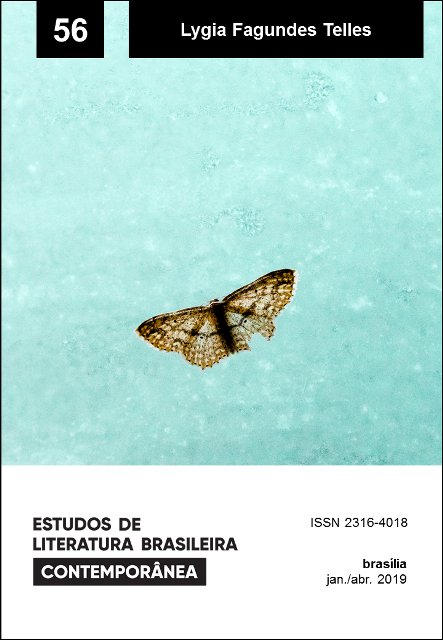Ordem vermelha: filhos da degradação, between high fantasy and dystopia
DOI:
https://doi.org/10.1590/2316-40185620Keywords:
fantasy, dystopia, fantastic, Felipe Castilho, contemporaneityAbstract
Capitalizing on recent discussions regarding the fantastic in fiction, this paper reflects on the innovation in the construction of the world Untherak, in Felipe Castilho’s Ordem vermelha: filhos da degradação (Red order: sons of degradation). The novel subverts that which is conventionally called high fantasy by introducing elements of dystopia, a narrative mode that has gained increasing significance within contemporary fiction for spotlighting social and political issues ”“ roused by the strong conservative wave in the second decade of the 21st century ”“, and whose basic features vastly diverge from fantasy theories.
References
BAßLER, Moritz (2016). Realismo, serialidade e fantástico. Variedades da narrativa de língua alemã na atualidade. Tradução de Valéria Sabrina Pereira. Pandaemonium germanicum, São Paulo, vol. 19, n. 27, p. 77-102. Disponível em: https://goo.gl/RRd57Q. Acesso em: 31 dez. 2017.
CASTILHO, Felipe (2017a). Cidade de Deus em Westeros. Revista Omelete Box, São Paulo, ano 1, n. 5, p. 40-43, dez.
CASTILHO, Felipe (2017b). Ordem vermelha: filhos da degradação. Rio de Janeiro: Intrínseca.
CESERANI, Remo (2006). O fantástico. Tradução de Nilton Cezar Tridapalli. Curitiba: UFPR.
HILÁRIO, Leomir Cardoso (2013). Teoria Crítica e Literatura: a distopia como ferramenta de análise radical da modernidade. Anuário de Literatura, Florianópolis, v. 18, n. 2, p. 201-215. Disponível em: https://goo.gl/4L6bfy. Acesso em: 31 dez. 2017.
KLEIN, Gérard (2009). Ficção Científica. In: RIOT-SARCEY, Michèle; BOUCHET, Thomas; PICON, Antoine. Dicionário das Utopias. Tradução de Carla B. Gamboa e Tiago Marques. Lisboa: Texto & Grafia, p. 123-127.
LESSING, Gotthold Ephraim (2011). Laocoonte ou sobre as fronteiras da Pintura e da Poesia. Introdução, tradução e notas de Márcio Seligmann-Silva. São Paulo: Iluminuras.
LEWIS, C. S. (2005). As Crônicas de Nárnia. Tradução de Paulo Mendes Campos e Silêda Steuernagel. São Paulo: Martins Fontes.
MACHADO, Samir Machado de (2016). Homens elegantes. São Paulo: Rocco.
MANGUEL, Alberto (2013). Prefácio à Edição Portuguesa. In: MANGUEL, Alberto; GUADALUPI, Gianni. Dicionário de lugares imaginários. Tradução de Carlos Vaz Marques e Ana Falcão Bastos. Lisboa: Tinta da China, p. xi-xxxi.
MARQUES, Mirane Campos (2015). Uma história que não tem fim: um estudo sobre a fantasia literária. Tese (Doutorado em Letras) ”“ Instituto de Biociências, Letras e Ciências Exatas, Universidade Estadual Paulista, São José dos Campos.
MARTIN, George R. R.; GARCÍA JR., Elio M.; ANTONSSON, Linda (2014). O Mundo de Gelo & Fogo: A hstória não contada de Westeros e As Crônicas de Gelo e Fogo. São Paulo: LeYa.
MATANGRANO, Bruno Anselmi (2014). Entrevista com o Professor Flavio García acerca da literatura Insólita em Língua Portuguesa. Revista Desassossego, São Paulo, n. 11, p. 180-187. Disponível em: https://goo.gl/mb5ZrZ. Acesso em: 31 dez. 2017.
MATANGRANO, Bruno Anselmi (2016). O olhar contemporâneo na releitura do moderno: A lição de anatomia do temível Dr. Louison. Estudos de Literatura Brasileira Contemporânea, Brasília, n. 48, p. 247-280. Disponível em: https://goo.gl/Qy44vK. Acesso em: 31 dez. 2017.
MATANGRANO, Bruno Anselmi (2018). Entrevista com o escritor Felipe Castilho. Jornal O Extra, Fernandópolis/SP, Caderno Cultura, Edição 3220, 27 jan. 2018. Disponível em: https://goo.gl/1UVisR. Acesso em: 23 jun. 2018.
MATANGRANO, Bruno Anselmi; TAVARES, Enéias (2018). Fantástico Brasileiro: o insólito literário do romantismo ao fantasismo. Curitiba: Arte & Letra, 2018.
MOUCHARD, Claude (2009). Contra-Utopias. In: RIOT-SARCEY, Michèle; BOUCHET, Thomas; PICON, Antoine. Dicionário das Utopias. Tradução de Carla B. Gamboa e Tiago Marques. Lisboa: Texto & Grafia, p. 84-89.
NOGUEIRA FILHO, Carlos Alberto (2013). Dimensões do fantástico e aventuras da tradução em The Lord of the Rings, de J. R. R. Tolkien. Dissertação (Mestrado em Letras, Literatura e Crítica Literária) ”“ Pontifícia Universidade Católica de Goiás, Goiânia.
NOVELLO, Eric (2017). Ninguém nasce herói. São Paulo: Seguinte.
PROPP, Vladimir (2010). Morfologia do conto maravilhoso. Rio de Janeiro: Forense Universitária.
THIÉS, Tainá Siqueira (2012). A transposição do real para o imaginário: hipertextualidade mitológica na construção de mundos ficcionais de fantasia. Dissertação (Mestrado em Literatura e Práticas Sociais) ”“ Instituto de Letras, Universidade de Brasília, Brasília.
TODOROV, Tzvetan (2008). Introdução à Literatura Fantástica. Tradução de Maria Clara Castello. São Paulo: Perspectiva.
TOLKIEN, J. R. R. (1999). O silmarillion. Tradução de Waldéa Barcellos. São Paulo: Martins Fontes.
WUNENBURGUER, Jean-Jacques (2003). L’Imaginaire. Paris: PUF.
Downloads
Published
Issue
Section
License
Authors who publish in this journal agree to the following terms:
a) The authors maintain the copyright and grant the journal the right of first publication, the work being simultaneously licensed under the Creative Commons Attribution License-Non Commercial 4.0 which allows the sharing of the work with acknowledgment of the authorship of the work and publication this journal.
b) Authors are authorized to enter into additional contracts separately, for non-exclusive distribution of the version of the work published in this journal (eg publish in institutional repository or as a book chapter), with authorship recognition and publication in this journal.
c) Authors are allowed and encouraged to publish and distribute their work online (eg in institutional repositories or on their personal page) after the editorial process, as this can generate productive changes, as well as increase the impact and citation of published work (See The Effect of Free Access).
d) The authors of the approved works authorize the magazine to, after publication, transfer its content for reproduction in content crawlers, virtual libraries and the like.
e) The authors assume that the texts submitted to the publication are of their original creation, being fully responsible for their content in the event of possible opposition by third parties.


